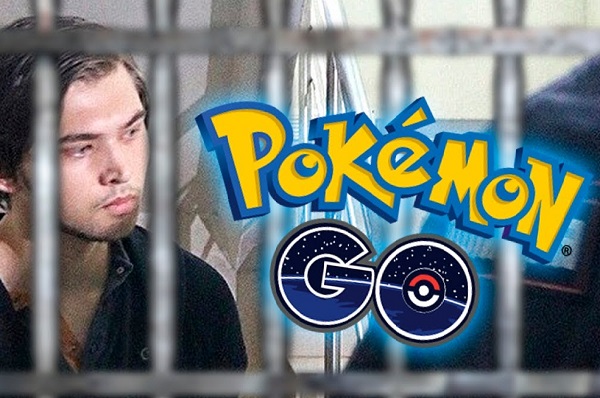
Amnesty International has officially declared a Russian Pokémon GO player a prisoner of conscience.
Yeah, that just happened. Ruslan Sokolovsky, the Pokémon GO player in question, has been charged with extremism and offending religious feelings. He is currently stuck in pre-trial detention.
For his critics, Sokolovsky was clearly “asking for it.” An avowed atheist, he had posted a video of himself playing Pokémon GO in a Russian Orthodox Church, and rejected the notion that he could be jailed for his actions. Today, not only is he behind bars, but he is also being portrayed as a monster by both church officials and the conservative press – mostly for sticking to his guns are refusing to repent in exchange for freedom.
Sokolovsky is being made an example of to frighten others. He’s being punished extra hard for not breaking psychologically.
When historians discuss Sokolovskiy a century from now – and, considering the church’s efforts tomake him into a martyr, it seems that this is inevitable – they will see this jailing not as the act of a mighty, all-powerful spiritual bureaucracy, but as an act of genuine insecurity.
In fact, Russia’s treatment of Pokémon GO players and other assorted “undesirables” can serve as a great example to the West on how NOT to shore up your political and moral legitimacy.
Psychologically speaking, we lash out against what we fear. A mighty Goliath does not need to throw a mountain at a flea.
Any religious institution, or the Holocaust Museum in Washington DC, for that matter, can request that visitors not try to nab Pikachu. Notice how the Holocaust Museum has not tried to have anyone prosecuted, though. Same goes for a St. Petersburg synagogue that gave a student the gift of kosher wine for going inside its building to play Pokémon GO.
If you believe in God, you can see how some random dude coming into your place of worship – and even making fun of your rules! – could be tomorrow’s faithful convert. Or he could not. Either way, you will take it in stride. In fact, officials and leaders who are secure in their positions and assured of their community’s support, take most things in stride.
If, on the other hand, you view your place of worship as a status symbol, and your role within it as that of enforcer over an unruly mob of local idiots, then you are likely to respond to simple teasing with a crackdown.
When I think about the treatment of Sokolovskiy, it reminds me of the erratic responses to the growing Black Lives Matter movement in the States. It reminds me of people who, in trying to contain and control the movement, actually legitimize it.
Consider this picture from Baton Rouge earlier this year, and the commentary provided by Brandon Friedman, a veteran of the U.S. armed forces in both Afghanistan and Iraq:
Baton Rouge PD looks ridiculous. I never wore so much armor in combat. This is their own community. (Photo: Reuters) pic.twitter.com/clCFFyD6jx
— Brandon Friedman (@BFriedmanDC) July 10, 2016
The woman in the picture, Ieshia Evans, can clearly be overpowered with ease. Friedman is right to point out the ridiculousness of the situation, from the armor to the body language.
The fact that the States is generally awash with guns doesn’t explain away the treatment of the protesters by police who, as Friedman is once again right to point out, are dealing with their own community here. The danger of the protest is that it is helping uncover systemic – and deadly – issues with American policing. Disproportionate responses make it obvious that, consciously or not, the police force knows that the protest has tremendous authority on its side.
You don’t fear something unless your conscience, or, at the very least, your subconscious, awards the object of your fear tremendous power.
Lack of authority is problematic precisely because it causes disproportionate responses that lead to more instability down the line. The example of how both the Russian state and church gradually delegitimize themselves by issuing obscene responses to something as inherently silly as a Pokémon GO player is one that should be carefully studied in the States.
Consider therise of Donald Trump. Trump is riding a wave of insecurity – both within the Republican Party, the political system as a whole, and insecurity in the minds of ordinary Americans. The anger of Trump supporters is the anger of millions of people who are afraid. The politics of hate that the Trump campaign thrives on, always targeted against weaker parties, be they Mexican labourers or a disabled journalist, are not derived from any kind of moral authority. Once again, when you seek to crack down on those far beneath you, you expose your own vulnerable position.
In Russia, in spite of Russian state TV’s continuing assurances that the country is “stable,” the regular citizen knows that stability has become a farce. The Russian economy continues to flounder. A political system that rests upon the shoulders of one man, Vladimir Putin, is inherently fragile. Ethnic tension brims below the surface of daily life. And instead of being a calming, or at least reflective presence, the Russian Orthodox Church is busy waging war on imaginary monsters and their fans.
These are all symptoms of a wobbly system in a slow-building crisis. And, whether we like it or not, in today’s world, crisis continues to be contagious.